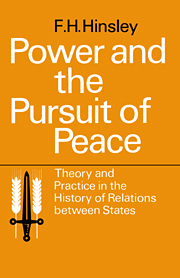Book contents
- Frontmatter
- Contents
- INTRODUCTION
- PART I A HISTORY OF INTERNATIONALIST THEORIES
- 1 To the End of the Seventeenth Century
- 2 Penn, Bellers and Saint-Pierre
- 3 Rousseau
- 4 Kant
- 5 Bentham and James Mill
- 6 The First Half of the Nineteenth Century
- 7 From the Crimean War to the League of Nations
- PART II A HISTORY OF THE MODERN STATES' SYSTEM TO 1900
- PART III INTERNATIONAL RELATIONS AND INTERNATIONAL ORGANIZATIONS IN THE TWENTIETH CENTURY
- References
- Index
- Frontmatter
- Contents
- INTRODUCTION
- PART I A HISTORY OF INTERNATIONALIST THEORIES
- 1 To the End of the Seventeenth Century
- 2 Penn, Bellers and Saint-Pierre
- 3 Rousseau
- 4 Kant
- 5 Bentham and James Mill
- 6 The First Half of the Nineteenth Century
- 7 From the Crimean War to the League of Nations
- PART II A HISTORY OF THE MODERN STATES' SYSTEM TO 1900
- PART III INTERNATIONAL RELATIONS AND INTERNATIONAL ORGANIZATIONS IN THE TWENTIETH CENTURY
- References
- Index
Summary
Immanuel Kant expounded his views in the Idea for a Universal History (1784) and, more elaborately, in Thoughts on Perpetual Peace (1795). He took over Rousseau's conception of the international state of nature: it was ‘a state of war which constantly threatens if it is not actually in progress’ and in which the true honour of the state was assumed to consist in ‘the continual increase of power by any and every means’. Like Rousseau and earlier writers he accordingly believed that ‘the state of peace must be founded’. But he did not suppose that the way out of the predicament was the merger of the separate states. On the contrary, he insisted on the necessary difference between the problems posed by the civil and international states of nature. For him, as for Spinoza a century before, individuals must combine to survive but states, by their very nature, could not. It was no more logical to hope to solve the international problem by the supersession of the states than it would have been logical to try to end the civil state of nature by the abolition of individuals.
This was a dominant theme in Perpetual Peace. It was stated explicitly in the second section of the essay where Kant explained ‘the second definitive article of perpetual peace’―the article by which ‘the law of nations should be based upon a federalism of free states’.
- Type
- Chapter
- Information
- Power and the Pursuit of Peace: Theory and Practice in the History of Relations Between States , pp. 62 - 80Publisher: Cambridge University PressPrint publication year: 1962



